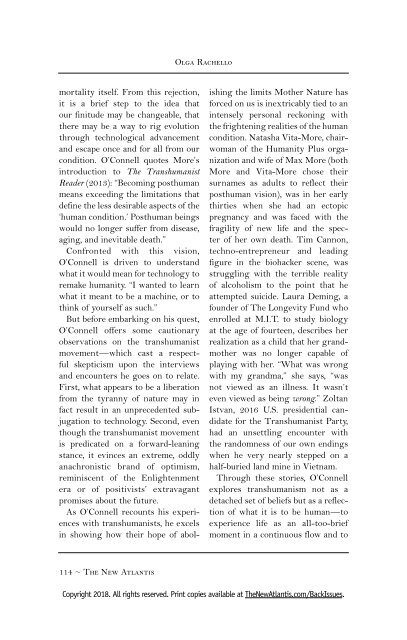The New Atlantis - Winter 2018 (Issue 54) uncompressed with cover
You also want an ePaper? Increase the reach of your titles
YUMPU automatically turns print PDFs into web optimized ePapers that Google loves.
Olga Rachello<br />
mortality itself. From this rejection,<br />
it is a brief step to the idea that<br />
our finitude may be changeable, that<br />
there may be a way to rig evolution<br />
through technological advancement<br />
and escape once and for all from our<br />
condition. O’Connell quotes More’s<br />
introduction to <strong>The</strong> Transhumanist<br />
Reader (2013): “Becoming posthuman<br />
means exceeding the limitations that<br />
define the less desirable aspects of the<br />
‘human condition.’ Posthuman beings<br />
would no longer suffer from disease,<br />
aging, and inevitable death.”<br />
Confronted <strong>with</strong> this vision,<br />
O’Connell is driven to understand<br />
what it would mean for technology to<br />
remake humanity. “I wanted to learn<br />
what it meant to be a machine, or to<br />
think of yourself as such.”<br />
But before embarking on his quest,<br />
O’Connell offers some cautionary<br />
observations on the transhumanist<br />
movement — which cast a respectful<br />
skepticism upon the interviews<br />
and encounters he goes on to relate.<br />
First, what appears to be a liberation<br />
from the tyranny of nature may in<br />
fact result in an unprecedented subjugation<br />
to technology. Second, even<br />
though the transhumanist movement<br />
is predicated on a forward-leaning<br />
stance, it evinces an extreme, oddly<br />
anachronistic brand of optimism,<br />
reminiscent of the Enlightenment<br />
era or of positivists’ extravagant<br />
promises about the future.<br />
As O’Connell recounts his experiences<br />
<strong>with</strong> transhumanists, he excels<br />
in showing how their hope of abolishing<br />
the limits Mother Nature has<br />
forced on us is inextricably tied to an<br />
intensely personal reckoning <strong>with</strong><br />
the frightening realities of the human<br />
condition. Natasha Vita-More, chairwoman<br />
of the Humanity Plus organization<br />
and wife of Max More (both<br />
More and Vita-More chose their<br />
surnames as adults to reflect their<br />
posthuman vision), was in her early<br />
thirties when she had an ectopic<br />
pregnancy and was faced <strong>with</strong> the<br />
fragility of new life and the specter<br />
of her own death. Tim Cannon,<br />
techno-entrepreneur and leading<br />
figure in the biohacker scene, was<br />
struggling <strong>with</strong> the terrible reality<br />
of alcoholism to the point that he<br />
attempted suicide. Laura Deming, a<br />
founder of <strong>The</strong> Longevity Fund who<br />
enrolled at M.I.T. to study biology<br />
at the age of fourteen, describes her<br />
realization as a child that her grandmother<br />
was no longer capable of<br />
playing <strong>with</strong> her. “What was wrong<br />
<strong>with</strong> my grandma,” she says, “was<br />
not viewed as an illness. It wasn’t<br />
even viewed as being wrong.” Zoltan<br />
Istvan, 2016 U.S. presidential candidate<br />
for the Transhumanist Party,<br />
had an unsettling encounter <strong>with</strong><br />
the randomness of our own endings<br />
when he very nearly stepped on a<br />
half-buried land mine in Vietnam.<br />
Through these stories, O’Connell<br />
explores transhumanism not as a<br />
detached set of beliefs but as a reflection<br />
of what it is to be human — to<br />
experience life as an all-too-brief<br />
moment in a continuous flow and to<br />
114 ~ <strong>The</strong> <strong>New</strong> <strong>Atlantis</strong><br />
Copyright <strong>2018</strong>. All rights reserved. Print copies available at <strong>The</strong><strong>New</strong><strong>Atlantis</strong>.com/Back<strong>Issue</strong>s.


